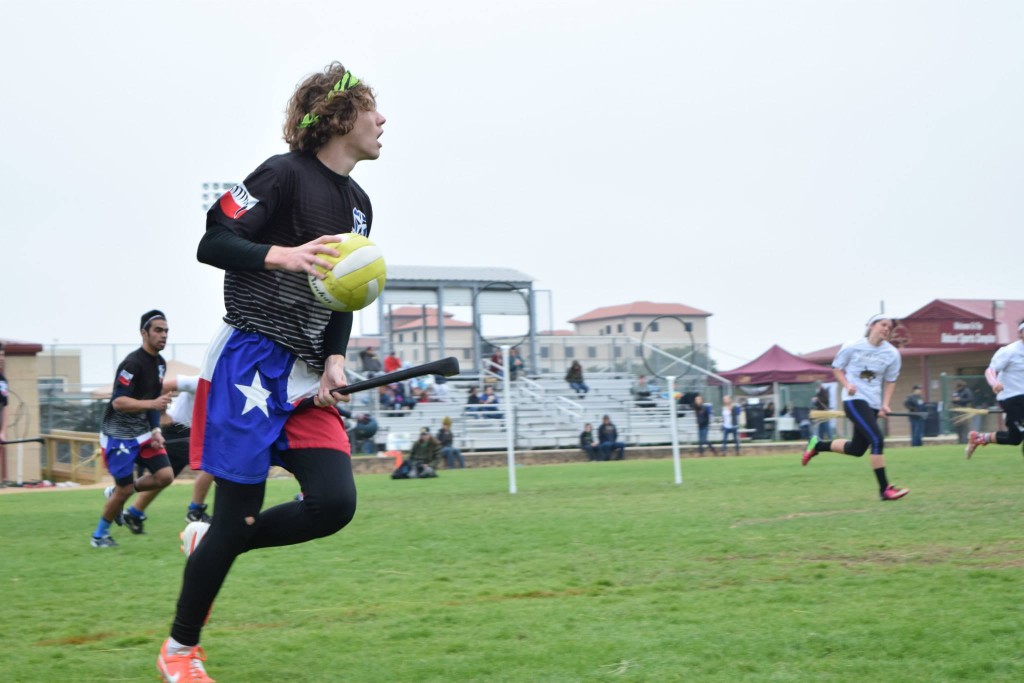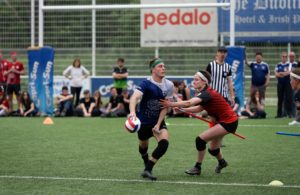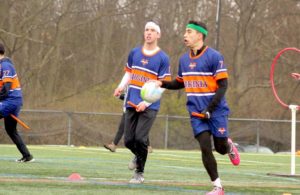- Rule, Britannia, no more?
- Unpopular Opinions: US Quadball Cup 2023
- Proven Contenders: University of Virginia
- Proven Contenders: Rutgers University
- Proven Contenders: University of Michigan
- Proven Contenders: Creighton University
- Different Perspectives: A Look Inside USA Ultimate
- Antwerp QC, Much of Belgian Core, Leaves Competitive Quidditch
Lone Star Crowned Southwest Regional Champion
- By Ethan Sturm
- Updated: February 23, 2015
Two weeks ago in the Alamo Cup semifinals, No. 1 Lone Star Quidditch Club looked vulnerable for about 10 minutes during a loss to No. 2 University of Texas. It was the first chink in the armor for the team all season, despite playing in the most competitive region in the sport.
But, at the Southwest Regional Championship, the all-star community team looked more invincible than ever, taking down the tournament without playing a single game in snitch range, the first team to accomplish such a feat at a regional this season. While it did not have an opportunity to get revenge on the Longhorns, the team did score a win over No. 3 Texas State University, 130*-60, and No. 4 Baylor University, 170*-100, in the semifinals and finals, respectively.
The tournament victory added a number of Lone Star players to the list of regional champions, including Kody Marshall, Sarah Holub and Stephen Bell, all of whom had won World Cup and Global Games gold but not a regional title. It was also the third Southwest title for Drew Wasikowski and Becca DuPont, who won the tournament in both 2011 and 2014 as members of Texas A&M University.
In the finals against Baylor, it was actually the Bears who got off to a stronger start, riding the momentum of a semifinal win over Texas, their first over one of the other top four teams all season. But after fighting their way to an early 20-10 lead, the wheels came off briefly for Baylor, as Lone Star responded with a 40-0 run to seize control.
From there, Lone Star staked its claim to the game, taking advantage of a poor shooting showing from the Bears to extend the lead to 110-40 nearly 15 minutes in. With the lead still at 60 when the snitch was released, Baylor finally showed its grit defensively, holding perhaps the most potent offense in the sport to just three more goals in 10 minutes of snitch-on-pitch play and cutting the deficit to 40. But Joshua Tates finally came through with the grab, ending all comeback thoughts and granting the community side its first major title in program history.
There was little drama on the road to the semifinals, with none of the region’s Big Four playing a single snitch-range game all weekend. Texas, which was without keeper Augustine Monroe, starting female beater Christian Dowdle and captain Kenny Chilton, who broke his foot in the first game of the weekend, often found itself looking vulnerable during the seeker floor. However, the Longhorns pulled away with the snitch on pitch. Their most nerve-wracking rendition of said game plan was a quarterfinal match against the University of Arkansas, which was still in range, if only briefly, when the snitch entered play. But Aryan Ghoddossy responded by driving through the entire Razorbacks’ defense, and the Longhorns never looked back.
Chalk held in many of the pools on Saturday, with A, B and D all playing out almost exactly as expected. Pool C also held little surprise other than an underwhelming showing from Sam Houston State University and a 3-1 day from the Texas A&M Silver Phoenix. Pool E, on the other hand, was insanity.
A pool that many thought could have been won by anyone, it played out exactly as such. Loyola University beat Texas A&M. Texas A&M beat Arkansas. Arkansas beat Loyola. The Razorbacks were in position to easily take the group on point differential, only for them to lose to Clonestar Quidditch Club in their last game of the day. Many believed this meant the pool belonged to Loyola. But after applying a complicated series of USQ Gameplay policies, the win over Pool E was attributed to the Aggies and, along with it, the best seed of any of the teams going into bracket play.
In total, 17 of the 22 teams participating at the Southwest Regional qualified for World Cup. Lone Star, Baylor, Texas, Texas State, Arkansas, Texas Tech University, Oklahoma State University, Texas A&M, UTSA, Loyola, Oklahoma Baptist University and Silver Phoenix automatically qualified by being the top 12 seeds going into bracket play, while Austin Quidditch, Osos de Muerte, Tribe Quidditch and Sam Houston joined them by winning play-in games. The final spot was fought for in the consolation bracket by Clonestar and Tulane Quidditch, with Clonestar getting the win and the bid by a score of 140*-80.
Injuries were a concern all weekend, with yet another major Southwest tournament looking more like a war of attrition than anything else. Lone Star lost Mollie Lensing to a likely broken hand, and Savannah Allison was knocked out of the finals as well. Baylor, meanwhile, lost Brittany Ripperger, who was injured much of last spring as well, to what is likely a torn MCL; Tim Brestowski to a likely meniscus injury; and Hannah Johns to a concussion. Add that to Chilton’s aforementioned injury and you get a rather daunting injury count.
With Southwest in the books, just two regional championships and 11 World Cup bids remain before the Cup is contested by 80 teams on April 12-13 in Rock Hill. Next weekend brings the South Regional with the Northwest Regional to follow on March 7.
Related Posts
About Ethan Sturm
Ethan is the co-founder and former managerial editor and chief correspondent of The Eighth Man. When not talking quidditch, which is rare, he can be found drilling people's teeth and spending time with his elusive wife. He's also the worst.




